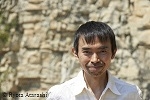The 50th Japan Foundation Awards
―Culture Transcending Borders― <2>
A Commemorative Talk session by Miyagi Satoshi and Miyagishima Haruka (Part1)
May 24, 2024
【Special Feature 080】
Special Feature: The 50th Japan Foundation Awards ―Culture Transcending Borders―(for summary on special features, click here)
Mr. Miyagi Satoshi, the General Artistic Director of The Shizuoka Performing Arts Center (SPAC), is an internationally acclaimed stage director who produces festive spaces on the stage through his unique fusing of physical movement, words, and music.
This article presents the content of Mr. Miyagi's lecture on "Theater that Transcends National Boundaries."
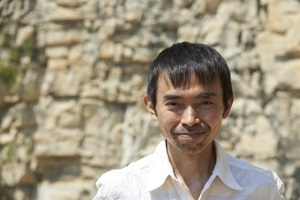 Miyagi Satoshi ©Ryota Atarashi
Miyagi Satoshi ©Ryota Atarashi
Theater that Transcends National Boundaries (Part1)
- Miyagishima:
I am from Shizuoka City, Shizuoka Prefecture, and my last name, Miyagishima, is a local surname from my hometown area. Personally, I feel very connected to the name Miyagishima. Miyagi Satoshi and I have very similar last names, and sometimes people from Tokyo ask me "Are you related to Miyagi Satoshi?," "Are you two family?," or even "Are you married?" However, we are completely unrelated. We are only connected as a director and an actor, and as a research subject and a researcher.
As I just mentioned, although there is no blood relation or family connection between us, Mr. Miyagi is like a father figure for me in the world of art, and I truly feel a deep connection with him.
When Mr. Miyagi assumed the role of Artistic Director of SPAC*¹ in 2007, he not only created his own works, but also focused on theater development as a window to the world, dedicating efforts to talent development programs for middle and high school students in Shizuoka Prefecture. At that time, I was a first-year middle school student, and I participated in all the talent development programs produced by Mr. Miyagi, and I have seen almost all of his works since 2007. After various twists and turns, I made my first appearance in Mr. Miyagi's work in Antigone, which was performed at the Festival d'Avignon in 2017.
Around the same time, I was enrolled in graduate school at the University of Tokyo. Initially, my research theme wasn't related to Mr. Miyagi's theater theory. However, as I became involved in Mr. Miyagi's works, I found the creative process and what was happening on the set with his works to be very interesting. That made me feel the desire to study it further and express these ideas on my own, so I wrote a thesis on Miyagi Satoshi's theatrical practice.
This January (2024), we released a project called The Rose Knight, in which I've worked alongside Mr. Miyagi. We meet almost every day during rehearsals, so he's a very familiar presence to me. However, at the same time, he's also the subject of my research, making him a significant figure for me, so I'm both excited and nervous to have the opportunity to speak with him in this way today. Today, I hope to delve deeply into Mr. Miyagi's creative philosophy and theatrical techniques, which have given birth to numerous works, while also answering any questions from the audience. I'm looking forward to our talk.
- *¹ Shizuoka Performing Arts Center
- Miyagi:
Thank you.
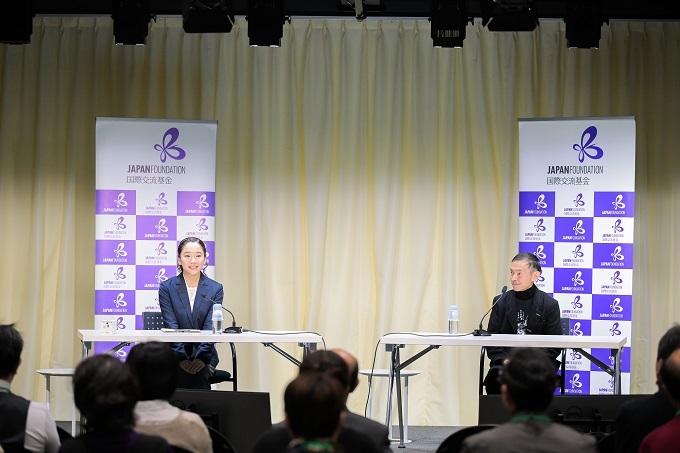 Dialogue at the JF Awards 2023 Commemorative Event Lecture
Dialogue at the JF Awards 2023 Commemorative Event Lecture
- Miyagishima:
There are many things I want to ask you, both as an actor and as someone who has written a master's thesis. First, I'd like to delve right into the main topic, which is also found in the title of today's lecture. What does "theater that transcends national boundaries" mean?
- Miyagi:
As for the title, I've come to understand something recently. In the past, no matter what genre I was in, I always felt like I wanted to be active on the world stage. It seemed like something that was pre-set, almost like a given. I even wondered if it might be a kind of imprint for my generation. In that case, why did I choose theater? Why, when I had the desire or even goal to perform on the world stage, did I go with theater? I hadn't really thought about the reasons for choosing theater at the time. It's the most inconvenient path to choose, isn't it? When you want to perform on the world stage, if you choose theater as a genre, the language barrier is much higher compared to music and other art forms, isn't it? Why did you choose the genre that's the most difficult to work in on a global scale, and why you still wanted to work on a global level? It's only recently that I've started to understand this. If I were to put it into words now, it's because I wanted to somehow prove that it's something with which humans can empathize.
I decided to pursue theater professionally when I was in my twenties, but it goes back to around my high school days when I was involved in social activism. There were various groups throughout Japan with common goals, specifically in support of political prisoners. For example, when a political prisoner received a death sentence, acquaintances of these political prisoners would form groups and push to have the sentence reduced. There were such people throughout Japan. Initially, once a death sentence was handed down, people would gather signatures, distribute flyers, and hold rallies all in a unanimous effort to somehow reduce the sentence. However, as time went on and the movement persisted, slight differences in ideology led to fragmentation within the groups. Things started falling apart over really minor issues. During my university days, I experienced such situations, and it left me feeling extremely disheartened.
People would promote solidarity, but I began to wonder if true solidarity among humans really exists. Without solidarity, I couldn't help but feel like the world wouldn't get any better than it was. Even if there's something wrong at present and you want to change it, if solidarity cannot be achieved, then perhaps we're left with no choice but to let the world just continue along as it is. I felt that in doing that, we might have to give up on the possibility of the world becoming a better place.
Although I was in the theater club during high school, I didn't really consider pursuing it as a career at that time. While pondering such things, theater resurfaced in my life. Theater seemed to me like a sort of dish where people with different perspectives could come together and collaborate, like a shared plate. There are always differing perspectives, as they say, "a hundred people, a hundred thoughts." Within such diverse groups, theater is a petri dish for experiments in a way, and if they can still work together in the theatrical dish, then perhaps solidarity or empathy isn't impossible. That's what I came to think, and I believe that's why theater resurfaced in my mind, reflecting on it later.
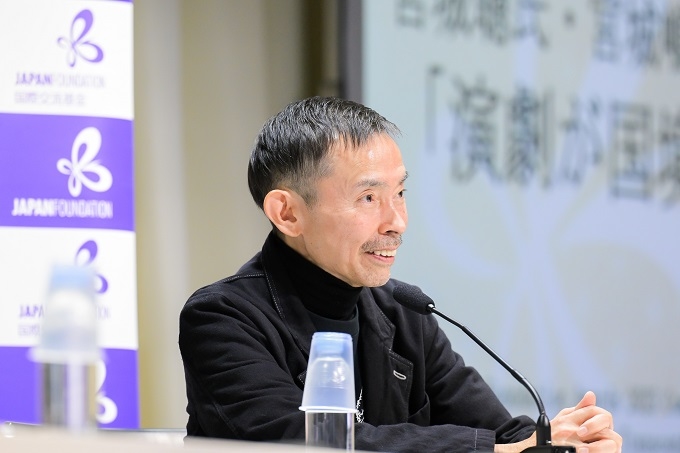 Mr. Miyagi explains why he wanted to pursue theater
Mr. Miyagi explains why he wanted to pursue theater
-
And if that's the case, then there are people on Earth with various backgrounds. For example, if their religions differ it means that the most important things to them are different. Can people with differing core values really work together? You might wonder if they can truly understand each other if the most important things to them are different, and that there's no way they can understand each other. But if you give up thinking they can understand each other, you inevitably conclude that the various conflicts and divisions in the world will never be resolved. If divisions cannot be resolved, how do we govern the world's conflicts? It ultimately comes down to power, doesn't it? It comes down to using power to silence people. It seems like currently silencing others with power is indeed happening, but this is not a world I want to live in looking into the future. Living a long time to come in a world where divisions are given up on and conflicts are contained by force doesn't appeal to me. Even if backgrounds differ vastly, I want to believe that there are moments of understanding. I seek that belief, that ray of hope, and I think that's why I've gravitated towards engaging with the world through theater.
As I mentioned earlier, theater is where these differences are most pronounced. For example, if we perform theater in Japanese and show it to someone who speaks a different language, for example someone from Saudi Arabia, the differences are immense, right? Yet, surprisingly, there are moments where the atmosphere in the audience and on stage inexplicably aligns, as if becoming one for an instant. It's not something that always happens. I mean, I don't think something like that would occur with a really bad play. It's kind of silly to say, but at moments like that I like to think that even the scattered humanity across the Earth right now, despite being spread out all over, until about 200,000 years ago, everyone was in a certain region in Africa. So, it wouldn't be strange if we could understand each other. Even with people from different backgrounds all over the world, their laughter still sounds the same. Interestingly, laughter is universal.
This makes me think that perhaps human beings are capable of understanding each other. Maybe that's what I'm seeking, deliberately choosing the most challenging genre of theater and wanting to work in various places. However, that doesn't really answer the question of what the title "theater that transcends national boundaries" means.
- Miyagishima:
When I first saw Mahabharata - Nalacharitam as a member of the audience in high school, while I didn't quite understand the plot, when the music intensified towards the end, there was this inexplicable sense of happiness, like an uplifting feeling from the depths of my stomach, a kind of indescribable happiness.
I've also had the opportunity to perform in overseas productions like Mahabharata - Nalacharitam and Antigone. I felt something similar, a kind of exhilaration, and I wondered if the audience might be feeling it too. While performing, I didn't feel like I was just delivering something to the audience. Rather, I felt like I was becoming one with the audience. Despite differences in language and religion, there was this sense of unity, this feeling of being together in the moment.
I felt like I was experiencing that kind of happiness both as an audience member and as a performer. While listening to your story, it feels like that might be the reason why I personally love the works of Miyagi Satoshi .
I myself have performed as part of the musical ensemble in your productions, like Antigone and Mahabharata - Nalacharitam. At SPAC, Your approach to incorporating music, such as actors playing instruments on stage, and your characteristic "two actors, one role"*² technique, seem like aspects that capture your worldview. Perhaps it's something resonate with us, and that is understood through theater, something like hope. Could you tell me more about how your approach has evolved to this point?
- *² A method of direction created by the theater company "Ku Na'uka," which Mr. Miyagi supervised. It is a style in which a single role is divided into a mover and a speaker, and two people play a single role together.
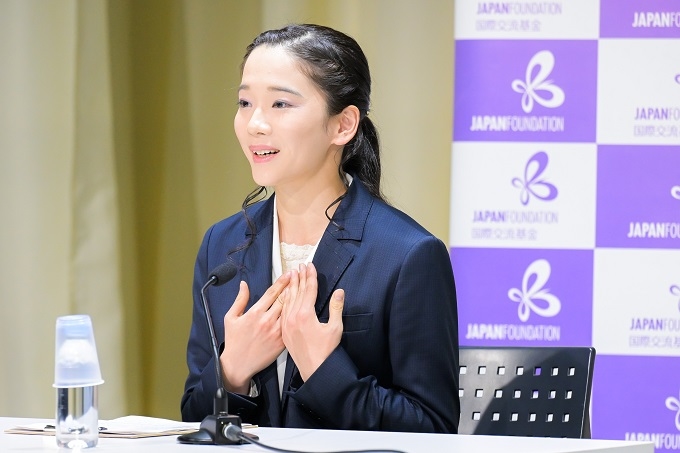 Ms. Miyagishima says she felt an inexplicable sense of happiness when she saw Mr. Miyagi's work for the first time
Ms. Miyagishima says she felt an inexplicable sense of happiness when she saw Mr. Miyagi's work for the first time
- Miyagi:
It seems like we are suddenly going to the crux of the matter.
When I thought about staging theater productions worldwide, my initial idea was quite simple. The reason I came up with the "two actors, one role" technique had to do with the idea that if we cast American actors to deliver the lines and Japanese actors for the physical movements, we could overcome the language barrier. It's a very straightforward concept, but that's what I initially thought about.
When showing plays in Japan, the audience is mostly people who understand Japanese, right? So, essentially, only Japanese speakers are the audience. Consequently, as performers, we can't anticipate environments beyond this audience of approximately 100 million people. Another crucial point is that actors who aren't Japanese speakers can't compete in this context. In other words, actors who can speak Japanese are essentially protected by what you could call a non-tariff barrier. Within the Japanese language market, even if there are incredibly talented actors from Russia, for example, they can't enter the Japanese theater world because they can't speak Japanese, which is in contrast to sumo wrestlers. That's why Japanese theater doesn't internationalize. When you're essentially confined to operating within this closed market, it creates a kind of isolation for actors and it's difficult to feel like you're truly part of the global theater community. It's like being in a safe zone within the road, so to speak.
Initially, I thought that removing that barrier and being able to showcase our productions overseas were essentially the same thing. So, I wanted to create a stage where actors can compete with or collaborate with each other regardless of their native language. That's how I first came up with the idea of "two actors, one role." What this means is that next time when American actors come to Japan to perform movements, they can act as actors, right? This way, from the perspective of actors who perform movements, both Japanese and American actors can compete on the same stage, right? Those were my thoughts initially, when I started using the "two actors, one role" method. So, that's how it was actually done overseas.
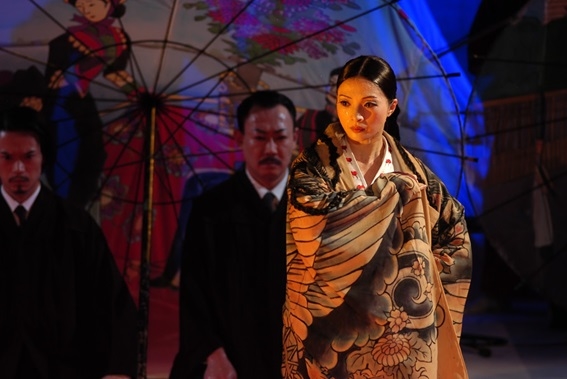 From Princess Medea ©Takuma Uchida
From Princess Medea ©Takuma Uchida
-
But eventually, if you were to perform overseas as a Japanese theater actor, I started to think that it wouldn't make sense if you weren't speaking Japanese and showing your body. It took me some time to get to this point, but as I started to interact with theater groups overseas, for example, when we went to India, we conducted workshops at Indian drama schools, where Indian actors spoke lines, and Japanese actors performed movements. That's how things were done. Now we have opportunities for Indonesian actors to come perform in Japan. For example, when actors from Bali came on stage and performed alongside Japanese actors, let's say they were sitting. I, as an audience member, would feel that the Indonesian actors were more interesting than the Japanese actors. I wondered why this is. All they did was walk out and sit in a chair. I wondered why the Indonesian actors seemed more interesting when they had simply walked out and sat on a chair. After looking at it in various ways, I came to realize that there are really subtle differences, like different movements that Japanese speakers wouldn't make. There are incredibly tiny details like this. Because I'm a director, I have the opportunity to see these things over and over again, so gradually I've come to understand such details. But I don't think most audience members would notice the differences to that extent. They might just vaguely feel like they've seen an Indonesian actor on an unconscious level.
So, you see, in a way, this is a sort of mystery. Why do such feelings arise? Why do these truly subtle differences come about? As I briefly mentioned earlier, it's because of the differences in the language we use for thinking. In other words, we think in Japanese as Japanese speakers, right? We think and act in Japanese. Of course, some actions precede words, like saying "ouch." But, for example, when you feel like drinking water, you might extend your hand. At times like this, you hear the words "I want to drink water" in your head, right? The words "I want to drink water" come to mind first, and then comes the action. For someone who thinks in English, "I wanna drink," or "I wanna drink a cup of water," and then reaches for water, their actions might be just slightly different, right?
What's the subject in the sentence "I want to drink water"? When we think about the subject in Japanese grammar, this is often referred to as the "elephant's nose is long" syntax. For example, what's the subject in the sentence "I want to drink water"? Isn't it interesting, in Japanese, the focus is on "water," rather than "I." If you study English for a while, you start to question Japanese grammar, but the word order is naturally different. And the subject "I" is often omitted in Japanese grammar, right?
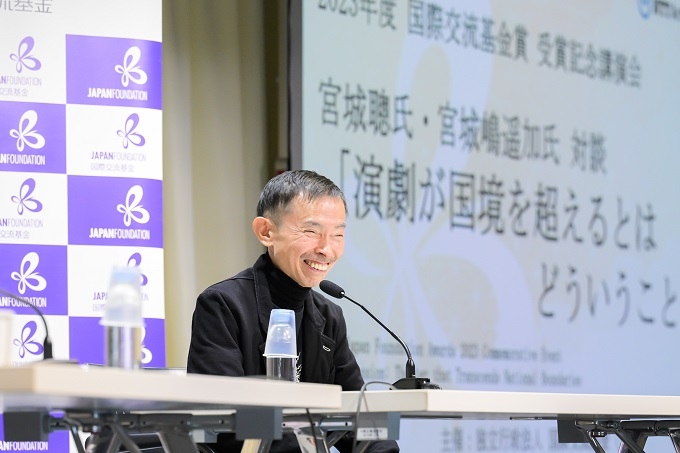
- So, it's as if depending on the language, there are certain constraints or tendencies that emerge in behavior. For example, when observing the relationship between the way people from Bali think and their use of language, and the slight differences in movement compared to those who think in Japanese, we end up noticing these mysterious aspects. It's these mysterious aspects that perhaps Japanese theater people should showcase abroad. After I began to think this way, and returning to my point from earlier, we've stopped casting English speakers for roles in the US. Instead, we've come to think that it's more essential to show how people speaking Japanese is different from people speaking English.
- Miyagishima:
You brought up a very interesting point about the use of "I" and other subjects in grammar. Although it wasn't for a Miyagi work, I had the opportunity to work as a Japanese person at a French company, some time last year. When I was speaking a foreign language and creating something, there were moments when my body felt different, and when I would use "I" a lot more, so it was quite different from how I think about things in Japanese. Changing languages makes my physical self and even my personality become more focused on an "I" perspective. I strongly felt that sensation. They say that Japanese people don't really use "I," and that there is no "I" in the Japanese language.
This might suddenly turn into a very intricate question, but one approach that I've taken in analyzing your works is the concept of modern subjectivity, the idea that "this is what I think," "this is my approach," "I can move my body as I wish," and "I can do anything," which I have used for my own thesis. In the works you've directed, various methods are employed, such as the "two actors, one role" technique. Also, there's this idea of "weak theater" or "poetic body," where lines are delivered in a somewhat monotone way. And if you look at the technique of in-play music, you'll see that in all of your works, there's this sense that the notion of "I" is being deconstructed. Like the idea that "I can move my body as I wish," or words are spoken as my emotions dictate, or "I can play a beautiful melody from start to finish just as I imagined it." It feels as if what I'm thinking somehow directly translates into expression. It's kind of like it's forbidden or dismantled in a way. Viewing your works from this perspective might be quite interesting, as I realized in the context of my own research.
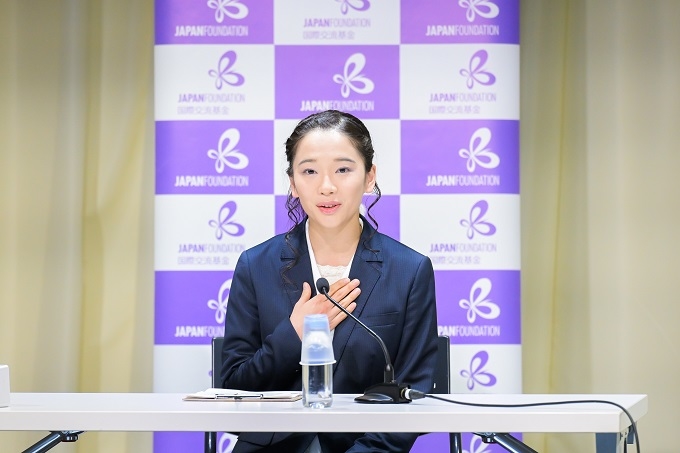 Ms. Miyagishima studied Miyagi Satoshi's theatrical practice at the University of Tokyo Graduate School
Ms. Miyagishima studied Miyagi Satoshi's theatrical practice at the University of Tokyo Graduate School
- As you pointed out before, because in Japanese there's no subject, perhaps the subject "I" makes a difference, and since there is no such subject in Japanese, expressions are born because of its absence. For example, through the "two actors, one role" technique or various methodologies where the concept of "I" is deconstructed. Sorry, my question is getting a bit unclear, but regarding your works, as I think about various things, how to perceive the existence of "I" has become a theme of strong personal interest for me now. Can you touch on that a bit more? Sorry, I know it's a vague question.
- Miyagi:
That's something I've been very conscious of. In other words, how what's referred to as Western theater can't escape from the constraints of modern selfhood, or its curse, I guess you could say, although that might sound a bit too negative. But ultimately, being confined to this idea of identity, of being oneself, is something I find very restrictive. Personally, for me, the purpose, or perhaps the destination, of theater as a genre feels very terrifyingly grounded in reality.
What I mean is, the ultimate goal becomes something incredibly realistic, such as creating the most accurate model of a citizen of modern society, of a citizen of modernity. It feels like that becomes the purpose, or the goal, of theater. And for me, that's not very exciting. To put it differently, is the model citizen of modern society, standing before others and being able to express one's opinions clearly and confidently, always having one's own thoughts. In a world where there's this idea that actors embody this model citizen of modern society, it can be said that the status of theater is high. But what I seek in theater isn't something so intensely realistic. In other words, as I mentioned earlier, it's more like, almost grandiose, almost dreamlike, something that anyone, regardless of who they are, can empathize with. That dreamlike quality is my goal. For that, it requires the power to cut through the adhesive or chains that bind humanity to its earthly existence, so to speak, and I believe that is the inherent power of theater.
Let me explain a bit. When I say humans are somewhat removed from reality from the outset, what I mean is, for example, you know the word "dream," right? When you say, "That's my dream," it originally referred to something you see when you're asleep. Originally, the images you see when you're asleep gradually transformed into a kind of ideal, right? The same applies to how the word "dream" is used in English. Why do you think that is? Why is it that those images you see when you're asleep gradually transform into an ideal?
I think it's because, in those images bubbling up in your mind when you're asleep, there are no physical constraints. In other words, your physical body, that anchor-like sensation, is absent. During sleep, your head is freed from the constraints of the body and gravity. So, it seems like a wonderful state to us humans.
In other words, humans are bound to the earthly realm in reality. They're bound to the earth by chains. Much of the arts deliberately detach from elements that bind humans to the earth. For example, dance aims to use as few words as possible. Novels can separate you from the crowd. It's okay not to have words, it's okay not to be a part of the crowd. Or as I mentioned earlier, it's okay not to have a physical body, like in a dream. In many cases, cutting one of the three chains is what often entertains people as art. Like how some images don't feature physical bodies. This allows us to move away from the oppression we usually feel. So, when we look at art, it feels good because part of that oppression which we can't avoid is gone.
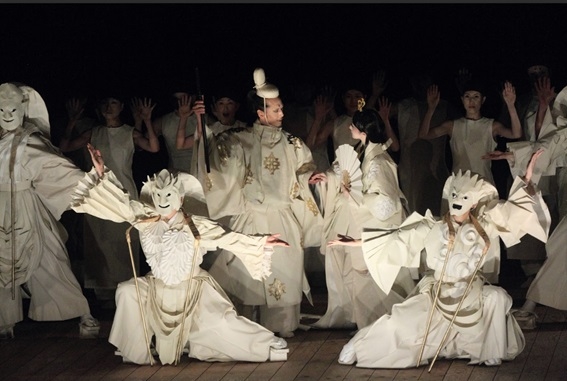 From Mahabharata - Nalacharitam ©Masami Hioki
From Mahabharata - Nalacharitam ©Masami Hioki
- However, theater has everything, that oppression, or rather, chains. Words, bodies, and crowds are all there. Furthermore, it's as if the locality, or the climate and environment, of the place where it's performed, cannot be replicated in a virtual space. If it's a hot country, it can only be performed in a hot atmosphere. It's an art bound tightly to the ground, where the actors are, but they somehow take off in some way. There's this so-called catharsis, unique to theater, a purifying ability, a purifying effect. Purification in this case means feeling refreshed. So, even though you're bound like this while feeling that way, the actors show a moment of taking off suddenly. I think that through the power of theater, various people on Earth who are bound by different realities are able to float away from those realities and empathize.
For example, when we were showing a play in Saudi Arabia, there was a moment when the atmosphere somehow unified for an instant, and during that moment of feeling unified, the people of Saudi Arabia and the actors from Japan felt like the chains they're usually bound by were momentarily cut, and they suddenly took off. So, there are moments where it feels like everyone is wishing for the same thing.
In that sense, it becomes difficult to establish this once you set a premise for identity. Becoming an exemplary citizen of a modernist society isn't really the goal, I feel like it's not that straightforward. Rather, as I mentioned earlier, theater has been around since ancient times, and it has always been there for taking off from reality. I think a lot of wisdom has been accumulated over the years for that takeoff. However, in modern times, it seems like we don't really look back at all on that wisdom. That's why I started using the "two actors, one role" method, and the reason I did so was very simple, as I mentioned earlier.
Another reason I adopted the "two actors, one role" method was because I personally felt a sense of detachment between words and body, or between logos and pathos, if you will.
I think many of the people who have acted on stage can relate to this. Even if stage actors aren't using the "two actors, one role" method when they're performing some kind of movement on stage, for example, let's say they make this kind of movement while saying, "Wow, it's hot," then the audience perceives that there's a physical feeling of heat within the actor's body, and the words "Wow, it's hot" naturally arise from that physical event, and then that naturally connects to the movement again. It's often thought that acting that appears natural is good, while the opposite seems awkward or deliberate. In other words, acting that seems deliberate is considered bad, and acting that looks natural is considered good. So, events that occur within the body, whether they're emotions or pathos, naturally connect to words, and words like "Wow, it's hot" result from those events, and then they naturally lead to such actions. Actors perform in such a way this connection between body and words is portrayed as if it's organically, or naturally, connected.
But when actors are actually performing, the part of their brain that says, "Wow, it's hot," and the part that's considering how much to raise their hand or when to stop as soon as the spotlight casts a shadow on their face are separate. What I just said sounds a bit theoretical, but what I mean is that actions don't naturally come out when you speak. Just because you speak doesn't mean that corresponding actions automatically occur. Speaking is speaking; it's its own thing. When you speak, you think about the kind of action that should accompany the words. That's its own separate process.
It's considered good acting to make it seem like these two wheels are moving simultaneously. I thought this was incredibly deceptive. Because even though these processes are disconnected within oneself, and even within the actor, it appears as if they're moving together. The audience might think it looks nice, and that the person's words and body are wonderfully integrated. But It crossed my mind that this could just be deceiving them. If there's a disconnect, then I thought showing that disconnect as it is would be a far more honest and truthful expression. So, people who speak, speak. People who move, move. Considering the reasons I mentioned earlier and these two reasons, I came up with the "two actors, one role" concept.
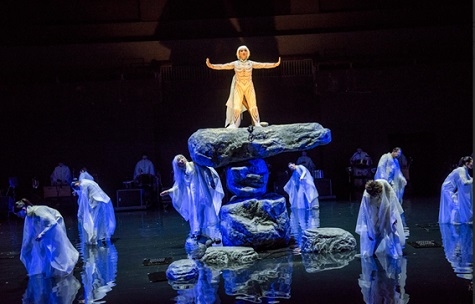 From Antigone ©Stephanie Berger
From Antigone ©Stephanie Berger
- When you do this, you almost automatically have to abandon the modern ego. When I came up with this idea around 1990, I thought that society had become extremely complex, and that's why words and body had become separated within humans. So, if society had been much simpler, they wouldn't have become so separate. They would have been more integrated, I thought.
At that time, I often thought, "What about the Manyoshu?" The Manyoshu wasn't originally composed in written characters. It was originally spoken and then documented. When you read the poems in the Manyoshu, especially those attributed to unknown poets, just reading those words made it feel like the body of the person who composed it would come to mind. For example, "yomigaere," which means "revive." When that word is spoken by someone from the Manyo period, like when they're facing a corpse, it feels like the body of the poet somehow becomes visible. Like, are they hungry? Do they need to pee? Are they in pain? They try so hard to interpret the tiny bits of information.
So, in a simpler society, I thought that words and body would be more integrated. And the reason for that is because later, after the Manyoshu, for example, in Heian period poetry, even if you read the words, you don't really picture the body of the poet at all. I believe that things became like this as society became more complex. I thought it was because of the urbanization of the Heian period, but eventually, I started to think that maybe it wasn't like that. I came to think that from the moment humans acquired language, this disconnect had already occurred.
So, a baby who doesn't know words tries to express how they feel, for example. If they're in some kind of crisis, they cry, or if they're feeling their best, they smile, right? When they do this, the people around them are interpreting a lot of information, not just the sounds coming from their body, but various information. If there's a baby, even strangers tend to glance at them, not just the parents. They wonder what they want or what they're feeling at that moment. The whole world peeks in on the baby, trying to decipher various things from the limited information available.
But what happens when they learn words? If they say they're hungry, no one looks anymore. Even if you want someone to look, it's too late. So, what do humans do then? They start to lie. They learn what lying is. Even if they're not in pain, they might say they are, or even if they're not scared, they might want to seem scared, as soon as they learn words. Because before knowing words, the whole world was peering in, but as soon as they start uttering meaningful words, no one pays attention anymore, not even the parents.
Almost everyone goes through this experience, being momentarily abandoned by the world. And at the very same time, acquiring words. It's like Adam and Eve eating the apple, right? So, we're expelled from that happiest state, but from there wisdom is born, and within that wisdom, lies are included.
However, at this point, there's already a disconnect between the actual events happening within one's body and words. So, from the moment humans acquire words, this disconnect between logos and pathos occurs.
I came to realize that later. Anyway, being able to express such things is what "two actors, one role" allows for. In order to do this, one cannot be bound by what's known as the modern ego. After all, words come from outside. For actors in motion, they become like jars, and words come into them. They become like jars, and words come into them. But interestingly, when they become mere jars, as soon as words enter, amazing events occur within the body.
- Miyagishima:
I still remember you saying to "stick a spoon into a jar of jam," although I didn't understand at first. The first time I was asked to play a "mover" role, you said, "It's like sticking a spoon into a jam jar." And I thought, "Ah..."
I try to actually discard the modern ego as a technique, but it's quite difficult. In rehearsals, you often tell me, "Ms. Miyagishima, you have a habit of letting your emotions show in your body." And if your emotions show, people won't give you their attention. You basically told me what you were just talking about. But nevertheless, acting as if you're discarding the modern ego is really difficult as an actor's technique.
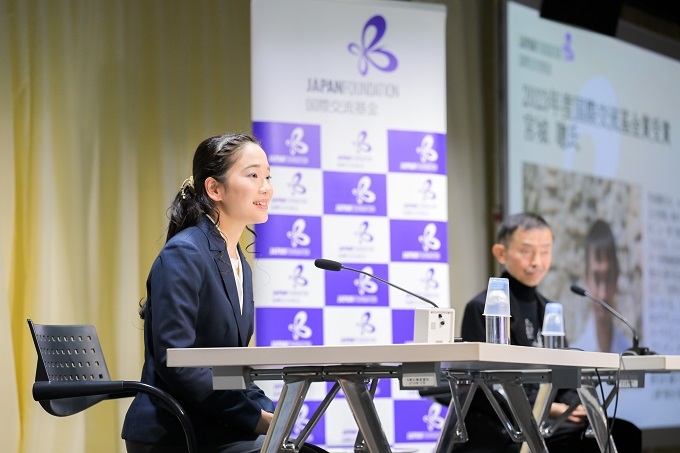
- On the other hand, I was born in the 1990s, and in the process of attending junior high, high school, university, and job hunting, my generation has always been exposed to situations where we're asked, "What are you thinking?" or "What do you ultimately want?" Situations where we're required to assert ourselves. Words like, "You have to be assertive." I've always thought my generation has been constantly exposed to words like that. Despite being told so often to be ourselves, when we actually start living in the real world, ultimately, there's nothing we can do as we please, and we feel like we're being confronted with this truth in everyday life.
When there's no illusion that we have the power to control or do something in the future, and when we start thinking, "Then how should I live?", I feel that your theatrical power, cultivated over 20 or 30 years, which involves abandoning the modern ego and possessing the power to break the chains of earthly existence, might offer some new insights, especially to my generation and the generations to come. Humans unavoidably face various influences from the outside despite being such fragile beings. However, that is not necessarily a bad thing. I personally believe that the methodologies and ways of thinking that you have developed over the years are incredibly useful. I think they might come to life and be incredibly beneficial. That's why I find your theater so fascinating.
Continued in Theater that Transcends National Boundaries (Part 2)
The commemorative talk session can be viewed on the Japan Foundation's official YouTube channel (English subtitles available).
Related Articles
Related Events
Keywords
Back Issues
- 2024.10.25 My Life in Japan, Li…
- 2024.5.24 The 50th Japan Found…
- 2024.5.24 The 50th Japan Found…
- 2023.12. 7 Movie Theaters aroun…
- 2023.6.16 The 49th Japan Found…
- 2023.4.24 The 49th Japan Found…
- 2022.12.27 Living Together with…
- 2022.12.27 Living Together with…
- 2022.8.12 Inner Diversity <…
- 2022.3.31 The 48th Japan Found…


